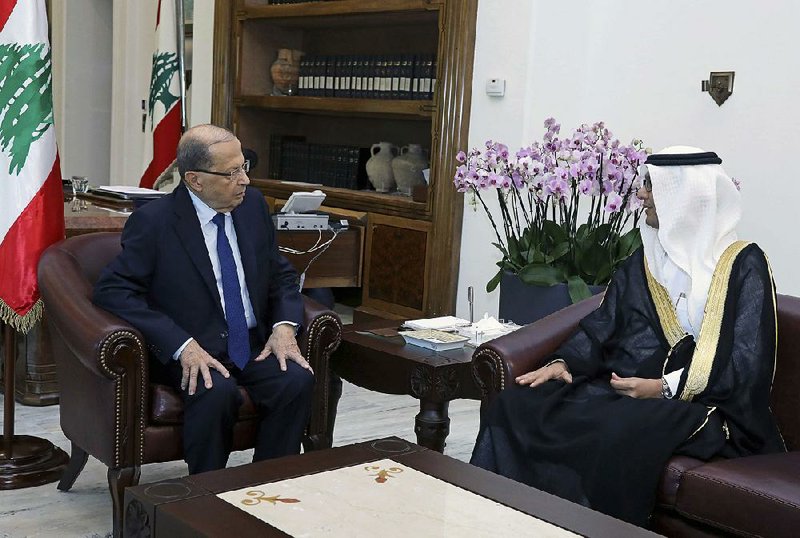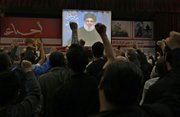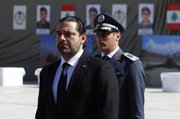BEIRUT -- Lebanese officials insisted Friday on the return home of Prime Minister Saad Hariri from Saudi Arabia, and the leader of the militant group Hezbollah said the Saudis had "declared war" on Lebanon by holding Hariri against his will.
The U.S. added its voice to those urging that Hariri be allowed to return to Lebanon. A political crisis has gripped the country and shattered the relative peace maintained by its coalition government since his announcement Nov. 4 from the Saudi capital that he was resigning.
The announcement from the Saudi-aligned Hariri jolted Lebanon and thrust it back into the regional rivalry between Saudi Arabia and Iran. The move and exceptionally strong statements by the Saudis against Iran that followed have deepened the mystery about Hariri's current situation and led to rumors that he is being held in the kingdom against his will, despite his denials.
For the past year, Hariri has headed a coalition government that included members of the Iranian-backed Hezbollah militia. He cited meddling in Lebanon and elsewhere in the region by Iran and Hezbollah in his decision to step down, adding that Iran's arm into the region will be "cut off."
Many saw the move as an effort by Saudi Arabia to wreck Lebanon's coalition government to try to undermine and limit Iran's influence in the country through the power that Hezbollah wields.
In a message apparently aimed at the Saudis but which could include Iran, U.S. Secretary of State Rex Tillerson cautioned against using Lebanon as "a venue for proxy conflicts."
If Hariri wants to step down, Tillerson said, he needs to "go back to Lebanon" and formally resign, "so that the government of Lebanon can function properly."
Lebanese President Michel Aoun told Saudi envoy Walid al-Bukhari on Friday that the manner in which Hariri resigned "was unacceptable," according to the state-run National News Agency. Aoun, too, called for Hariri's return.
In a televised speech, Hezbollah leader Hassan Nasrallah said Hariri was being detained in Saudi Arabia and that his "forced" resignation was unconstitutional because it was made "under duress."
"It is clear that Saudi Arabia ... declared war on Lebanon," he said.
Nasrallah said he was certain that Hariri was forced to resign as part of what he called a Saudi policy of meddling in Lebanon's affairs. Hariri is being prevented by Saudi officials from returning to Lebanon, he said, adding that his detention should not be accepted.
Tillerson said he's seen "no indication" that Hariri was being held against his will.
An official in French President Emmanuel Macron's office also said Hariri has told foreign ambassadors in Saudi Arabia, where he has been since the resignation announcement, that he is not a prisoner.
The French and U.S. ambassadors met with Hariri, who "says he is not a prisoner, the [Saudi crown] prince says he is not a prisoner," said the official, who spoke on condition of anonymity because he was not authorized to talk to the media.
Macron visited Saudi Arabia on Thursday and met with Crown Prince Mohammed bin Salman to discuss the tensions between the kingdom and Lebanon, a former French protectorate.
The French official said Hariri did not ask to see Macron, and French officials "don't have any specific signs" that Hariri's life is in danger.
French Foreign Minister Jean-Yves Le Drian told Europe-1 radio that "to our knowledge" Hariri is not being held against his will, adding that France believes "he is free in his movements, and it is up to him to make his choices."
WARNING FROM U.N.
Amid the rising tensions, Saudi Arabia and other Persian Gulf countries ordered their citizens to leave the country. Dozens of citizens of Gulf Arab countries were seen leaving Lebanon early Friday via Beirut's international airport.
In remarks to reporters while flying from China to Vietnam, Tillerson said Washington "supports the stability of Lebanon and is opposed to any actions that could threaten that stability."
U.N. Secretary-General Antonio Guterres also said it's essential that Lebanon remain peaceful, warning that a new conflict could have "devastating consequences" in the region. Guterres said he'd been in contact with the leaders of both countries and that it's "important to preserve the unity, the stability of Lebanon and the functioning of its institutions."
Hariri's appointment as prime minister and the formation of his government was a result of a tacit agreement between Iran and Saudi Arabia to sideline Lebanon from other regional proxy wars, particularly in neighboring Syria.
Iran is widely seen to have prevailed over mainly Sunni rebels in Syria, and with the wars in Yemen and the crisis in Qatar at an impasse, analysts said, the Saudi crown prince may have decided to try to curb Iran's influence in Lebanon.
In his speech, Nasrallah said Saudi Arabia is punishing Lebanon's people instead of his group. He said the kingdom has shifted its attention to Lebanon after a failed 30-month war in Yemen and with Saudi-backed rebels in Syria suffering setbacks.
"If you think that you can defeat Lebanon, the resistance [Hezbollah] ... then you are wrong, mistaken and will fail, the way you did in all arenas," Nasrallah said.
Lebanese officials are acting with caution, insisting on Hariri's return before starting the complicated task of forming a new government.
"The safety net Lebanon had is no longer in place," Sami Nader, head of the Beirut-based Levant Institute for Strategic Affairs, said by phone Thursday, adding that Lebanon may face the same kind of economic sanctions imposed by a Saudi-led alliance on Qatar since June. "We should expect further escalation from Saudi Arabia against Lebanon."
Without providing any proof, Nasrallah said Saudi Arabia had asked Israel to attack Hezbollah in return for billions of dollars.
Nasrallah said war with Israel is unlikely during the Hariri crisis, adding that the group is watching carefully for any Israeli attempts to use it to begin hostilities against Lebanon. He said Israel is cautious and unlikely to make such a move.
Still, he warned Israel against "miscalculation" or "taking advantage of the situation."
Israeli officials have been publicly predicting another war with Hezbollah while also vowing to do all they can to postpone it.
"There are now those in the region who would like Israel to go to war with Hezbollah and fight a Saudi war to the last Israeli," said Ofer Zalzberg, a Jerusalem-based analyst for International Crisis Group. "There is no interest in that here."
Prime Minister Benjamin Netanyahu has long considered Iran to be Israel's foremost enemy, a nuclear threat as well as a strategic adversary seeking to convert postwar Syria into a staging ground for attacks against Israel or into a corridor to transfer missiles and other weapons to Hezbollah in Lebanon.
Saudi Arabia's stepped-up efforts to oppose Iranian influence in Lebanon drew measured applause in Jerusalem. But many Israelis fear that the aggressive actions by the Saudi crown prince could drag Israel into a war it does not want.
Further elevating regional tensions, shortly after Hariri's speech on Saudi television, Iran-backed Houthi rebels in Yemen fired a missile at the international airport in Riyadh. Saudi officials said the attack could be an Iranian "act of war."
Then, the Saudi crown prince ordered the arrest of hundreds of Saudis, including members of the royal family, in what was either a crackdown on corruption, as Saudi officials put it, or a purge, as outside analysts have suggested.
Tillerson weighed in Friday on the wave of arrests by Saudi Arabia's Crown Prince Mohammed bin Salman over allegations of corruption.
Tillerson said the arrests are a matter of concern and should be watched carefully for broader repercussions throughout the region.
Tillerson said he had spoken to Saudi Foreign Minister Adel Jubeir, who allayed some of his concerns, but added, "How disruptive it's going to be remains to be seen."
Information for this article was contributed by Zeina Kara, Bassem Mroue, Sylvie Corbet and Angela Charlton, Josh Lederman and Sarah El Deeb of The Associated Press; by Dana Khraiche, Kambiz Foroohar and Donna Abu-Nasr of Bloomberg News; by Tracy Wilkinson of the Tribune News Service; and by Anne Barnard and David M. Halbfinger of The New York Times.
A Section on 11/11/2017


